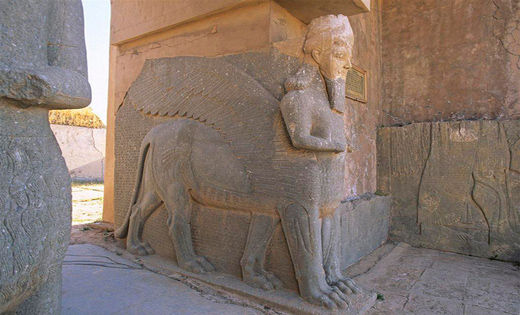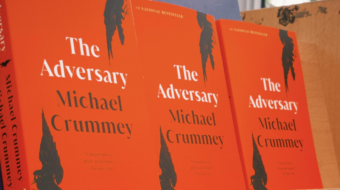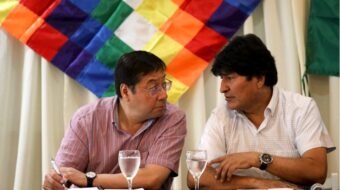
Back in 2006, before he became vice president, then-Sen. Joe Biden advocated dividing Iraq up into three parts – Kurdistan in the north, a Sunni stronghold in the west, and a Shia state in the center-south. That plan went nowhere, as it quickly became apparent that Iraqis had no interest in carving up their state. Biden was “widely condemned” in Iraq and his proposal “met with popular rejection and anger,” according to Salam Ali of Iraq’s well-respected Communist Party. Even the Kurds, who have an autonomous region with its own parliament, were not about to leave the framework of the Iraqi state.
Now, the notion is again being raised, including by Biden’s co-author Leslie Gelb of the Council on Foreign Relations.
An article in the National Journal earlier this year bore the headline “Turns Out, Joe Biden Was Right About Dividing Iraq.” It quoted Robert Baer, a former CIA officer in the Middle East who “remains in frequent touch with Iraq’s Sunni tribes,” as saying: “Iraq is breaking apart before our eyes along the natural sectarian borders of Kurdistan, Sunni-stan, and Shiite-stan, and that drift apart looks increasingly inevitable.”
Inside-the-Beltway columnist Fareed Zakaria, in a Washington Post article headlined “An enclave strategy for Iraq,” calls religious/ethnic separation “a tidal trend.”
It’s not just Washington insiders. Longtime peace activist Tom Hayden suggested last week that “The Sunnis [in part of Iraq] will need an autonomous zone like Kurdistan.” He asks, “If we already support a Kurdish autonomous zone, complete with its own fighting force, within the borders of Iraq, why shouldn’t Iraq’s oppressed Sunnis have an autonomous zone of their own in northern and western Iraq?”
But the Kurds are a unique ethnic group with a distinct language, territory, cultural heritage and existing autonomous regional governance, while Sunnis and Shia are religious denominations within Islam. Are Hayden, Biden or others really advocating dividing countries along religious lines?
There are real practical problems to carving up Iraq in this way, CNN’s Tim Lister points out. “Sunni areas in the west would not be economically viable unless they received a share of oil revenues from other regions; theirs is the only part of Iraq not sitting on lakes of oil,” Lister writes.
Further, he notes, “There are also few natural borders, and plenty of areas – especially Baghdad and Diyala province – where the different communities live cheek by jowl.”
Ali made the same point. “There about one million Kurds living in Baghdad (with a population of 7 million),” he said via email. “Sunnis in Basra [in Iraq’s Shiite-majority south] are estimated to be about 20%.” Extremist Islamist militias in 2006-2007 “attempted to carry out sectarian cleansing in Baghdad by terrorizing people that had been living peacefully alongside each other for generations,” he said, yet despite this, there are still several mixed Sunni and Shiite districts in Baghdad.
“Any attempt to impose a partition of areas outside the Kurdistan federal region into two sectarian-based (Sunni and Shiite) regions will lead to sectarian cleansing on a large scale in big mixed areas, especially in Baghdad and Diyala province, with catastrophic consequences for the people,” Ali said.
Iraq has numerous ethnic and religious minorities who do not fall neatly into Sunni-Shia-Kurd categorization. They suffered under the Saddam Hussein dictatorship, and are now being targeted for extermination or expulsion by Islamic State (ISIS/ISIL) fanatics. Among them are Turkmen, Yazidis, Shabaks, Assyrians and Christians. Ali Mehdi, an Iraqi Turkmen politician, told the Financial Times, “There is a plan to divide Iraq into Kurds, Sunni and Shia. We are the ones living on the dividing line and because of that we’ve been exposed to great tragedy.”
Salam Ali emphasizes that “Iraq’s religious communities and ethnicities have always lived in peace and harmony. It is the policies of ruling classes and their dictatorial regimes that have promoted sectarian and nationalist discrimination, to serve their narrow political interests and maintain their dominant position.”
But is Iraq an artificial entity rather than a real nation-state? Is it just a set of arbitrary border lines drawn by the British and French during World War I – the famous Sykes-Picot agreement – as a way for those two imperial powers to divide the booty of the collapsing Ottoman Empire’s Middle Eastern territory? The “Islamic State” has declared a new Islamic caliphate spanning existing borders, announcing that Sykes-Picot is “dead.” But western commentators are also saying essentially the same thing.
Raid Fahmi, a member of the Iraqi Communist Party’s political bureau, says it’s true that the borders drawn up by the Sykes-Picot agreement were arbitrary. But, Fahmi said in an email, historians also point out that the area of Mesopotamia, where modern day Iraq is located, “historically represented a continued extension, geographically, culturally and economically. It is therefore not correct to consider the Iraqi state as totally an artificial creation, despite the fact that Iraq with these specific borders had not existed in the past.”
Fahmi also noted that the Sykes-Picot borders created a “landmine” by betraying promises to the Kurdish people that they would be granted a state. Instead the Kurds were divided among Iraq, Syria and Turkey. (Iran also has a Kurdish minority.) Iraqi Communists have long defended the right of the Kurds to self-determination, including establishing a separate state if they so choose. But they argue that Kurdish federalism within a democratic Iraq offers the best option for the Kurdish people. The Communist Party of Kurdistan – Iraq, which works closely with its Iraqi counterpart, also takes that view.
“The borders of all modern states, or most of them, have not existed historically as they do at present,” Fahmi pointed out. “These states, however, have been able, through building their institutions, and creating mechanisms and symbols of national integration and affiliation, to create and strengthen a national identity. This has been further consolidated by incidents of defending the homeland, as well as popular struggles and social movements aiming to achieve political, social and economic goals, gains and rights. This applies to Iraq.”
The building of national identity in Iraq has included development of a rich civic and cultural life spanning religious and ethnic boundaries. But it has been hampered by sectarianism fanned first by the Saddam Hussein dictatorship and then by the U.S. occupation, with rival regional powers Saudi Arabia and Iran contributing to the strife. Says Fahmi, “The last three decades have witnessed a continued fragmentation of the pillars of this national identity.”
A significant section of the Iraqi public is not willing to let the country split up. More than 100 civil society organizations have signed a “Civil Initiative” that outlines grassroots and national actions aimed at “achieving civil and societal peace to defeat terrorism and to ensure the construction of a civil democratic state.” The organizations include women’s, human rights, journalists’, anti-violence, youth and similar groups from both central Iraq and Iraqi Kurdistan. The activities of such groups are not reported in western mainstream media. Yet their existence indicates that viewing Iraq as simply an arbitrary, permanently feuding collection of religious/ethnic sects is missing the reality.
Photo: Human headed winged lion, in Nineveh, near present day Mosul, Iraq. Nineveh was an ancient Assyrian city on the eastern bank of the Tigris River, and capital of the Neo-Assyrian Empire. Mosul is currently controlled by the extremist Islamic State. James Gordon (CC)
Updated 9/14/14: A spokesperson for the Iraqi Communist Party emphasizes that it and the Communist Party of Kurdistan – Iraq support federalism for the Kurdish region within a unified democratic Iraq. The parties use this wording rather than “autonomy.” The article has been updated to reflect that wording. Federal status for the Kurdish region was included in Iraq’s Constituion adopted by a referendum in 2005.










